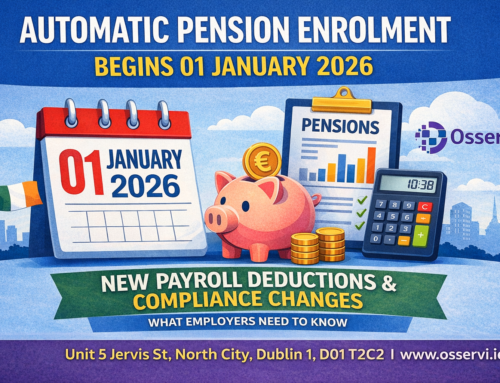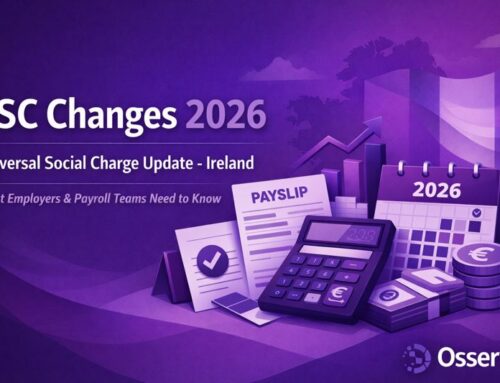In a significant shift in the timeline for pension reform, the Irish government has officially postponed the rollout of the much-anticipated autoenrollment pension scheme to 2025. Originally scheduled to commence in 2024, this delay affects hundreds of thousands of workers and thousands of employers across Ireland. This blog will explore the reasons behind the postponement, its implications for businesses and employees, and what actions employers should take now to prepare for the eventual rollout.
What Is Autoenrollment?
Autoenrollment is a national pension scheme that aims to automatically enroll employees into a workplace pension plan, ensuring that more workers have sufficient retirement savings. Under the proposed scheme, eligible employees who are not currently members of a pension scheme will be automatically enrolled, with the option to opt out later if they choose.
Contributions will be shared among employees, employers, and the State, with escalating rates over time. The goal is to combat Ireland’s low pension coverage, especially among private sector workers, where only about 35% have an occupational pension.
Why Has Autoenrollment Been Postponed?
The Irish Department of Social Protection cited a variety of logistical, technical, and legislative challenges for the deferral. Among the key issues:
-
IT Infrastructure: The centralized system for managing contributions, opt-outs, and transfers has not been finalized. Developing a secure, efficient, and scalable IT platform has proven more complex than anticipated.
-
Legislative Delays: Drafting and passing the legislation necessary to establish the Central Processing Authority (CPA)—the body that will oversee the autoenrollment system—has taken longer than expected.
-
Operational Readiness: Employers, especially SMEs, require more time to adapt their payroll systems and processes to accommodate the new scheme. This delay offers breathing room to better prepare HR and payroll functions for integration.
While disappointing to some advocates of pension reform, many employers have welcomed the delay as it allows them additional time to plan and budget for new financial responsibilities.
Key Features of the Autoenrollment Scheme
When the scheme launches in 2025, it will follow these general parameters:
-
Eligible Workers: Employees aged between 23 and 60, earning over €20,000 annually, and not already in a pension scheme will be automatically enrolled.
-
Contribution Rates: Initially, employees and employers will each contribute 1.5% of gross salary. This will gradually increase every three years until both contribute 6% by year 10. The State will also contribute 0.5%.
-
Central Processing Authority (CPA): A new public body will manage the scheme, handling administration, investment, and compliance oversight.
-
Opt-out and Re-enrollment: Employees can opt out after six months but will be automatically re-enrolled after two years unless they actively opt out again.
Implications for Employers
Although the delay provides some short-term relief, it also signals the urgency for long-term preparation. Employers should not take the postponement as an opportunity to ignore the upcoming responsibilities. Instead, the additional time should be used strategically.
Here’s what employers can do now:
-
Assess Current Pension Coverage: Review existing pension schemes to identify which employees may be impacted.
-
Engage Payroll Providers: Ensure that payroll software and service providers are aware of the scheme’s structure and are preparing necessary updates.
-
Budget for Contributions: Begin factoring in the financial implications of employer contributions in long-term budget planning.
-
Educate Staff: Use the time to inform employees about the coming changes. This can reduce confusion and build trust when the system goes live.
-
Stay Informed: Monitor developments from the Department of Social Protection and seek professional advice on regulatory compliance.
What Does This Mean for Employees?
For workers without occupational pensions, the postponement delays an important opportunity to begin building retirement savings with assistance from their employer and the State. However, it also gives them time to understand their options and assess their personal savings goals.
In the meantime, employees can:
-
Voluntarily Join Pension Schemes: Even without autoenrollment, many private pension options are available now.
-
Seek Financial Advice: Learn how pensions work and why saving early significantly improves retirement outcomes.
-
Monitor Scheme Details: Understand the contribution rules and opt-out/re-enrollment provisions to make informed choices once the scheme begins.
Final Thoughts
Ireland’s autoenrollment pension system represents one of the most transformative social welfare reforms in recent decades. While the delay until 2025 may seem like a setback, it also offers an opportunity for all stakeholders to prepare more effectively.
Employers should take this time seriously—review systems, engage with advisors, and educate staff. When implemented correctly, autoenrollment will enhance financial security for thousands of workers and bring Ireland in line with pension practices in other developed countries.
Continue Reading
Get a personal consultation.
Call us today at (01) 5170179
Packages to suit your budget (we are on avg 30% better value than competitors)..
Frequent Searches Leading To Pages:
Payroll Services Ireland | Payroll Services | Payroll Ireland | Payroll Outsourcing Ireland | Outsourced Irish Payroll | Outsource Payroll Services Ireland | Outsourced Irish Payroll Services Dublin & Ireland | Ireland Payroll Service | Payroll companies Ireland | Payroll service provider





